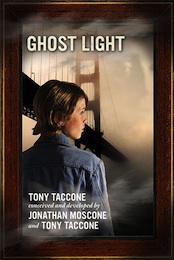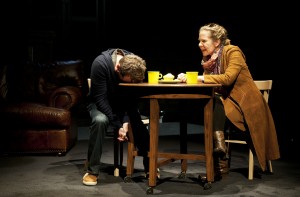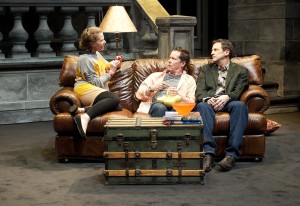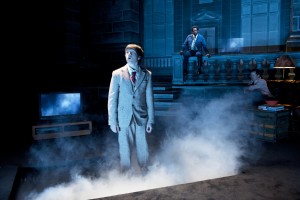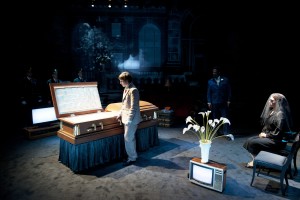GHOST LIGHT LEAVES US IN THE DARK
Assassin Dan White ensured Harvey Milk’s legacy when he shot the openly gay San Francisco politician. The gay community continues to hold Milk as a martyr to their cause, and the artistic world has kept Milk’s spirit alive in book (The Mayor of Castro Street), documentary (The Times of Harvey Milk) and cinema (Milk). While Milk’s popularity continues to increase, little is known outside of San Francisco about the first victim of White’s double murder on that fateful day in 1978: Just a few doors down from Milk’s office in City Hall lay the dead body of Mayor George Moscone, one of the first politicians in the United States to open his doors to minorities, senior citizens, and gays. Moscone, whose name graces SF’s convention center, became even more of a historical footnote when White was found guilty of voluntary manslaughter (rather than first-degree murder) and the gay community rioted at City Hall. Historians have noted that had Moscone been the sole victim of White’s animosity, the killer, most likely, would have been in jail for life.
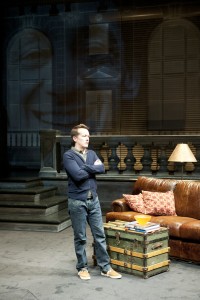 Sadly, Moscone still remains an enigmatic, background figure in the world premiere of Tony Taccone’s Ghost Light, which happens to have been conceived, developed, and directed by Moscone’s own son, Jonathon Moscone. In attempting to tell the story of a man who has yet to fully comprehend and process the death of his well-loved but largely absentee father, the creators developed a triptych narrative. Each of the three narrative lines involves ghosts and centers on openly gay Jon Moscone (Christopher Liam Moore), a petulant and disgruntled adult who is stuck in his life both personally and professionally: First, he is incapable of coming up with a concept for a production of Hamlet, which he is slated to direct (even as he berates acting students about their approach to the scenes with the king’s ghost); second, his depression manifests itself in all manner of ghosts; and lastly, there is the despairing Boy (Tyler James Myers) who presumably represents Jon as a teenager.
Sadly, Moscone still remains an enigmatic, background figure in the world premiere of Tony Taccone’s Ghost Light, which happens to have been conceived, developed, and directed by Moscone’s own son, Jonathon Moscone. In attempting to tell the story of a man who has yet to fully comprehend and process the death of his well-loved but largely absentee father, the creators developed a triptych narrative. Each of the three narrative lines involves ghosts and centers on openly gay Jon Moscone (Christopher Liam Moore), a petulant and disgruntled adult who is stuck in his life both personally and professionally: First, he is incapable of coming up with a concept for a production of Hamlet, which he is slated to direct (even as he berates acting students about their approach to the scenes with the king’s ghost); second, his depression manifests itself in all manner of ghosts; and lastly, there is the despairing Boy (Tyler James Myers) who presumably represents Jon as a teenager.
The usage of ghosts is a clever theme, but the device backfires because the specters are both literal and figurative; as such, they only serve to interrupt the narrative, which is shaky to begin with. Thus, it’s easy to become detached from the protagonist’s journey because we are too busy trying to figure out who these ghosts are, why they are there, and where they reside. Are they in Jon’s dreams, are they in his memory, or are they actual phantoms ’¦ or a combination thereof?
A perfect example is the Boy, who is either seen in a psychiatrist’s office, sitting with his mother at the funeral, or clutching the coffin containing his father. Are we to believe that this is a manifestation of distorted dreams, actual events, or Jon’s overwhelm with life?
Other ghosts haunt our understanding of the play as well: Jon’s current relationship is with an on-line suitor named Loverboy (Danforth Comins), who early on in the play sexily emerges from Jon’s bed only to be accosted by the apparition of another ghost — a threatening prison guard (Bill Geisslinger) who wants to send Jon a message. But since Loverboy is a figment of cyberspace, created by Basil (Ted Deasy), a man who Jon has yet to meet, we are perplexed that one ghost confronts another ghost instead of going directly to the source. The guard (as is explained in the guide to the play, not the play itself) is a “family ghost — the spirit of Moscone ancestors; consequently, the character retains aspects of Jon’s grandfather, who had worked as a prison guard in San Quentin.” Taccone should take a hint from Tony Kushner’s Angels in America (which Taccone himself commissioned): When the ghost of Prior’s relative appears, he lets us know exactly who he is — a victim of the Plague. Being an uninformed spectator at Ghost Light, I eventually gave up trying to figure out if the guard is an actual ghost, a representational ghost, or a dream ghost, and found myself distanced even further from the play.
Another clever conceit (which makes sense in the guide to the play, but is frustratingly unclear on stage) is that of Mister (Derrick Lee Weeden), who was at the scene of the assassination, but is now an African-American messenger of some kind. The notes tell us that he is a spirit guide who wishes to transport the soul of the boy’s father to the other side, but the father remains stuck between the worlds of the living and the dead because the boy will not let go (he even crawls into his father’s coffin at the end of Act I). This struggle between the two ghosts is meant to dramatize why Jon remains blocked in his life, yet this is not made clear to us.
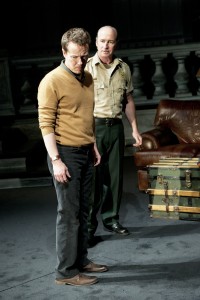 Taccone (who was artistic director of Berkeley Rep when it was bestowed a Tony award for Best Regional Theatre) has shown his prolific prowess as a director, including previous productions at Oregon Shakespeare Festival. His playwriting debut shows that he can create some sharp exchanges and insightful political musings, but he has yet to clearly dramatize his themes into dialogue, which, like the ghosts in his play, remain ambiguous.
Taccone (who was artistic director of Berkeley Rep when it was bestowed a Tony award for Best Regional Theatre) has shown his prolific prowess as a director, including previous productions at Oregon Shakespeare Festival. His playwriting debut shows that he can create some sharp exchanges and insightful political musings, but he has yet to clearly dramatize his themes into dialogue, which, like the ghosts in his play, remain ambiguous.
Although it was never the creators’ attempt to educate us about the life and times of George Moscone, two things are missing from the play that we need to understand in order to help us relate to the struggling Jon: First, what actually happened between the father and his son prior to the untimely death? Their relationship is hinted at but never dramatized, so we can only guess what it is that Jon lost when his father was killed. The second thing is our understanding of the effect that the assassination had on the boy. Director Moscone says in his notes that no play could ever tell the real story of his dad or how he lost him, a story that he calls “the most unexplainable of events”; this is a most unjustifiable explanation for not getting to the meat of the story. Maybe Moscone followed his own life too closely for this dramatization; perhaps he should have invented some kind of back story.
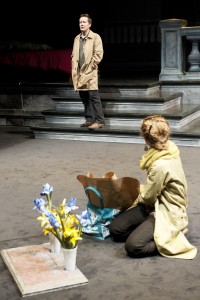 Moreover, we are largely uninterested in Jon as a person and what it meant for him to grow up in the shadow of a larger-than-life father; we simply have no sympathy for the protagonist’s journey. When his best friend Louise (Robynn Rodriguez) tells Jon that she’s never seen him “act like this before,” does that mean that Jon was at one time functional and only now is popping pills and guzzling Grappa to drown out the ghosts who are associated with the death of his dad some thirty years before? And if that’s the case, is it really just the script of Hamlet that triggered this sudden onslaught of spooks?
Moreover, we are largely uninterested in Jon as a person and what it meant for him to grow up in the shadow of a larger-than-life father; we simply have no sympathy for the protagonist’s journey. When his best friend Louise (Robynn Rodriguez) tells Jon that she’s never seen him “act like this before,” does that mean that Jon was at one time functional and only now is popping pills and guzzling Grappa to drown out the ghosts who are associated with the death of his dad some thirty years before? And if that’s the case, is it really just the script of Hamlet that triggered this sudden onslaught of spooks?
Oregon Shakespeare Festival was wise to commission a play about a moment that changed the course of American history, especially since it also incorporates Hamlet, but this play skirts around the universality of father and son relationships by focusing on the seemingly trivial problems of Jon. It makes sense now that the Boy sits in a psychiatrist’s office dodging questions about his father’s murder — it seems that both Moscone and Taccone dodge the tough questions surrounding this fascinating event. There really is no story here. It ultimately feels like one long psychiatric session where Jon emerges with a greater understanding of his father’s political contributions. He appears at the end of the play to be the same person we met at the beginning, watching the ghost of his dad bojangling off into the wings where, presumably, heaven awaits him (we never find out if this is as Jon remembers him or as Jon wishes to see him).
Lastly, one specific device points to the conflict that is missing in Ghost Light: when the lights come up on the house and we are acting students, Jon castigates us as to our inability to capture the essence of the scenes with the ghost of Hamlet’s father. The breaking of the fourth wall feels like a wasted theatrical opportunity because it was not used as a vehicle to show us Jon’s fragility — all we get is an exasperated teacher. A much bolder choice would be for Jon to have an embarrassing breakdown in front of his students upon recollection of his own father.
While the play contains intriguing subject matter, it is a source of great consternation that what could have been a fascinating memory play becomes instead a chain of ghosts looking for a story worth haunting.
photos by Jenny Graham
Ghost Light
Oregon Shakespeare Festival in Ashland, OR
end on November 5, 2011
for tickets, call 800.219.8161 or visit OSF
